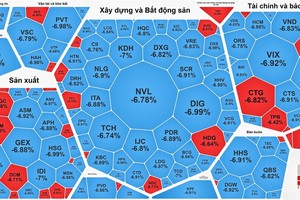 Lack of linkage is a barrier for most Vietnamese enterprises
Lack of linkage is a barrier for most Vietnamese enterprises
Many limitations
According to the White Book on Vietnamese Businesses 2020, issued by the Ministry of Planning and Investment, there are currently around 750,000 businesses in operation nationwide. Besides these, there are several business associations, such as the Cocoa Coffee Association, the Textile and Apparel Association, the Seafood Processing and Exporting Association, the Leather and Footwear Association, and the Wood and Forest Products Association.
Over the last few years, Vietnam has been known as a major supplier of many commodities such as rice, coffee, pepper, seafood, and wood. However, paradoxically, despite the rapid growth in quantity, Vietnamese enterprises have not yet built national brands that are strong enough in terms of products on an international level, to be able to compete with major brands in the world. Some of the many limitations of Vietnam businesses today is competitiveness, participation in the market, and participation in the supply chain and value chain.
At a recent seminar on private economy, organised by the Ministry of Planning and Investment, Mr. Nguyen Chi Dung, Minister of Planning and Investment, expressed his concern that Vietnamese enterprises have not yet even overcome their vulnerability, and it is very difficult for enterprises to do business with each other because each one is afraid of the other, which is very strange. Mr. Nguyen Chi Dung said that private enterprises, especially SMEs, must push to join the value chain, even though it is a difficult issue that requires the participation of the whole political system.
According to Minister Nguyen Chi Dung, lack of linkage is a barrier for most Vietnamese enterprises, in two aspects, that in joining the value chain of FDI enterprises, and also for building their own value chain. For joining the global value chain, when large FDI enterprises invest in Vietnam, they often have a supply chain to follow or develop their own closed chain, so opportunities for Vietnamese enterprises become difficult.
For self-building value chains, basically, the scale of Vietnamese enterprises is small, and limited in management technology and quality of human resources. Vietnamese enterprises are almost unable to accumulate capital to invest, improve productivity, improve product quality to meet strict requirements, and also lack connection with each other. This makes it difficult for Vietnamese enterprises to build their own value chain.
In fact, most Vietnamese enterprises in general and private enterprises in particular only focus on individual interests. They are only interested in their own brands, their own products, and do not clearly see the benefits of building brand names for industries or goods. Moreover, it is undeniable that associations, due to limited resources, have not brought into full play their role and capacity in management and orientation, and have not yet been built the strength to represent the group that is strong enough to compete.
These limitations are the reasons why Vietnamese enterprises are still weak, unable to compete with foreign corporations and companies at home, or also the world market. Big businesses can take care of themselves, but most SMEs operate fragmentally, with lack of solidarity and sometimes unfair competition.
Lack of teamwork
Many economists believe that cooperation amongst Vietnamese enterprises is lacking and weak. Enterprises are not focused on improving links and competitiveness to participate in the regional and global value chain. Currently, only about 21% of SMEs participate partially in the global value chain, and 14% are successfully linked with foreign partners, even though the number of FDI enterprises in Vietnam is very high.
Mr. Pham Dinh Doan, Chairman of Phu Thai Group, and Vice Chairman of Central Council of the Vietnam Business Association, commented that businesses must get acquainted and build their own teamwork culture because the strength of the world in the next century will depend on the strength of teamwork, and it is best if enterprises become aware of this issue soonest. Mr. Doan feels strongly that domestic enterprises need to strengthen linkages, support, cooperation, overcome themselves, give up bad business practices, and prepare for strong chain linkages for further growth.
In order to build a strong teamwork culture within businesses, it is necessary to have strong encouragement and support policies from the Government. In this respect, the success of Japanese enterprises could be a model example for Vietnamese enterprises today. In 2018, Japan ranked second in the world in terms of national brands according to a survey of Anholt National Brand Index, but to get that result, Japan had a methodical development strategy with specific policies.
In March 2009, the Japan Brand and Content Industry Professional Investigation Committee announced a Japan Brand Strategy. The strategy called for enterprises in the industrial sector to cooperate in order to promote their strengths and improve their brand value in the medium and long term. Then, in 2012, Prime Minister Shinzo Abe’s administration continued to promote the strategy of building national brands using stronger measures. As a result, just four years later, the Japanese industrial market expanded and achieved an impressive growth. According to statistics of the Ministry of Interior of Japan, in 2016 the total value of turnover of the industrial market in Japan reached 11,690 billion yen.
The success of Japanese enterprises could be a model example for Vietnamese enterprises today.
























